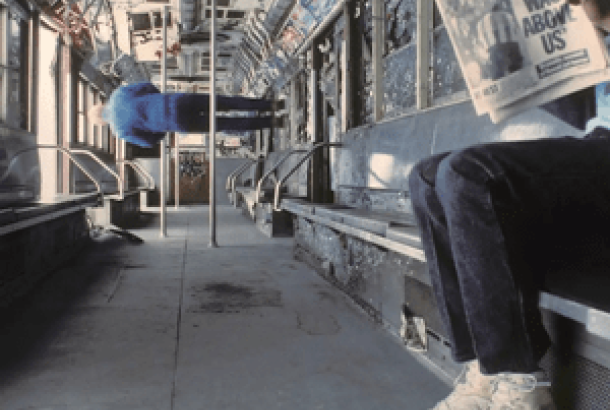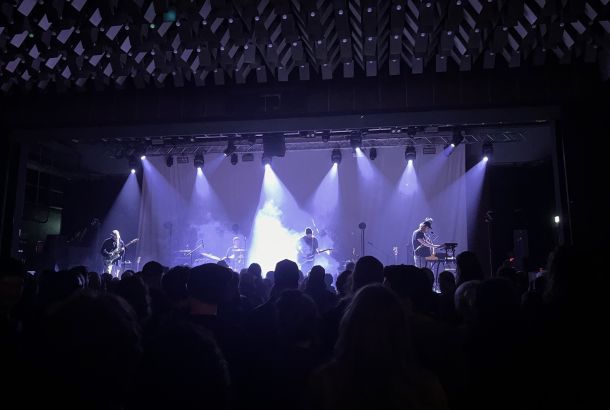Live: Psappha play Maxwell Davies and John Horne
By Hugh Morris
23rd January at Hallé St. Peters
8/10
The late Sir Peter Maxwell Davies spoke of the “honour to have one’s music performed by an ensemble who understand it intimately”. An artistic inspiration for Psappha, the programming of some of his finest chamber works was a poignant reminder of how well they understand this music, and how sorely he will be missed both in Manchester and beyond.
The opening concert of Psappha’s 25th Anniversary Season should have been (and, to its credit, was) a celebratory occasion for those involved in the mightily successful project involved in bringing professional contemporary classical music to Greater Manchester.
And yet, David Horne, whose commission Resonating Instruments was given its world premiere alongside two pieces by Maxwell Davies, alluded to his sadness at memories of his last encounter with ‘Max’ being on that very stage.
The performance outlined the importance of the wider, non-musical experience in contemporary music, a tenet executed superbly throughout. The intimate yet flexible performing space of Hallé St Peter’s combined with dramatic lighting to aid the more atmospheric and theatrical parts of the programme, particularly in the first piece, Maxwell Davies’ Stedman Doubles, a piece once labelled ‘unplayable’.
The members of Psappha certainly demonstrated the gulf in class between themselves and the intended performers sixty years ago, conveying a hugely assured performance. Led by clarinetist Dov Golberg, the piece opens with a restrained, understated woodwind line, eventually accompanied by 3 percussionists, progressing through a series of edgy soundscapes.
Similar music is often scoffed at for being too extreme, but, in the case of Stedman Doubles, any extremity was replaced with the feeling of stillness and situation, the piece being based on the principles of Indian raga improvisation. The contrast in quiet dynamics (the final clarinet swell in particular) was thrilling, even if generally, some more overstated passages could have articulated the three section work more clearly.
Writing for cimbalom is a medium few British composers have experimented with, yet David Horne told of his fascination of an Eastern European instrument that Stravinsky included in Les Noces and that Zoltan Kodaly wrote extensively for in his famous suite Háry János.
Resonating Instruments is a twenty-minute concerto for cimbalom, accompanied by violin, cello, flute and clarinet. The piece explores the untapped timbres of the instrument, beginning with a dark, almost submerged impression, before gradually ascending through the instrument’s range. If Stedman Doubles was understated, the repetitions needed to sustain the cimbalom’s strings made Resonating Instruments anything but, with the string dynamics and expansion of register from a fixed point mirroring the techniques heard in the solo instrument.
Many of the aspects of the piece came off in performance very well indeed. The contrasting use of mallets and beaters, and the muting of strings brought out even more interesting colours. There were lovely pairings of lines too; delightful duets came from the unlikely sources of bass flute and bass clarinet. The only downside of this was that the pairings of strings, winds and keyboards reduced the impact of the solo cimbalom, played wonderfully by Psappha’s Artistic Director, Tim Williams.
To think that Eight Songs for a Mad King is almost twice the age of Psappha is a strange thought indeed, yet nobody could deny its performance was the reason a sizeable amount of the audience were present. The piece, premiered in 1969, follows the famous tale of George III and his descent into madness, and is a classic in the repertoire.
Kelvin Thomas reprised the role of the King, a role which he has played on tour with Psappha and in the video recording of 2013. As a visual spectacle, the drama was enticing. Thomas obviously loves the role of the Mad King, yet there was enough freshness to make the piece’s famous moments, such as the dialogue between the King and the ‘bullfinch’ part (and the smashing of the violin), unexpected even for audience members who had listened before.
The piece features the Schoenberg-influenced Sprechstimme technique, placing the voice somewhere between speaking and singing; this technique was lost at some points by Thomas; his 2013 recording conveys the linear regression of the character to his eventual death more vividly through the continued use of that specific extended technique.
Maxwell Davies’ humour was placed excellently however; the Handelian references, the ‘Country Dance’ foxtrot and harpsichord interludes fed into a very well-staged, characterful performance. The level of understanding of what Max really wanted is without comparison in any other group.







